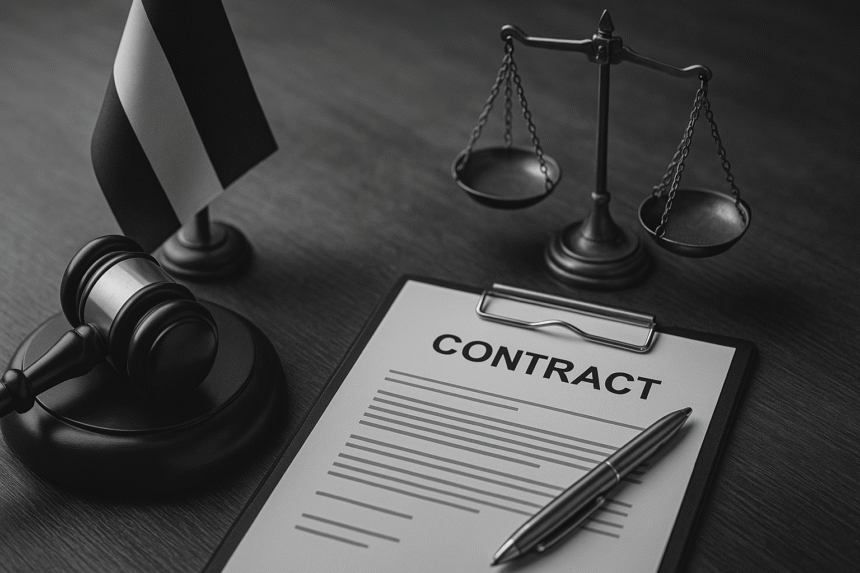Why Good Dispute Clauses Matter More Than Good Contracts
Most business owners believe that a well-drafted contract is their ultimate protection. But here’s what I’ve learned after reviewing hundreds of agreements and resolving dozens of disputes: Even the best contract means little if your dispute resolution clause is weak or missing.
I’ve seen airtight contracts fall apart the moment one party breaches, simply because the parties didn’t agree on how to resolve the conflict. The court was in another country. The arbitration clause was vague. The process was unclear. And suddenly, what seemed like a strong legal foundation became a legal minefield.
This article is a reflection on why dispute resolution clauses deserve more attention—and how they often save businesses more than any other clause in the agreement.
What Most People Get Wrong
Ask a founder, CEO, or contract drafter what makes a contract strong, and most will say:
- Clear scope
- Solid payment terms
- Defined deliverables
They’re right—those things matter. But they overlook something critical: Contracts are written for when things go wrong.
Most people focus on the “perfect scenario” when everyone performs. But if a disagreement arises (and it often does), you’ll rely entirely on the dispute clause to resolve it.
Many contracts either:
- Default to vague boilerplate text
- Choose arbitration without naming a venue or language
- Refer to courts in foreign jurisdictions clients never expected
The result? Even when you have the right, you can’t enforce it efficiently—or affordably.
Why Dispute Clauses Deserve More Attention
Here’s the truth: Your dispute resolution clause is your emergency plan.
Think of it like a fire escape. You hope you never need it—but when things go bad, you need it to work flawlessly.
Why This Clause Is More Important Than You Think:
- It decides where and how the dispute will be resolved.
- Will it go to court or arbitration?
- Which country’s law applies?
- What language will be used?
- It determines cost and access to justice.
- Local courts may be cheap, but ineffective.
- Arbitration may be fair, but expensive.
- It controls speed and confidentiality.
- Public courts = slower, public filings
- Private arbitration = faster, but needs a clear path
- It can neutralize power imbalance.
- Without a clear clause, the stronger party chooses the forum
- A weak party may simply walk away because they can’t afford to fight
Real World Consequences:
- Businesses spending tens of thousands on foreign litigation
- Clients stuck with unenforceable judgments
- Missed opportunities to settle because of confusion over venue
Your dispute clause can save you from all of this.
A Real-Life Example: When a Good Contract Wasn’t Enough
A UAE-based company entered into a joint venture with a European technology provider. The contract was detailed—clearly outlining the services, timeline, and payments.
But the dispute clause? One vague line: “Any disputes shall be referred to arbitration.”
When the European party stopped delivering, the UAE firm tried to trigger arbitration. But there was no:
- Named arbitration center (e.g., DIAC, ICC, LCIA)
- Seat of arbitration
- Language specified
The opposing party challenged the jurisdiction—and won. Months of work and payments were lost. The UAE company had to start over, in a foreign court.
Lesson learned: The entire contract failed—not because it lacked detail, but because the exit path was broken.
The Counterpoint: “A Good Relationship Makes Disputes Unlikely”
Some say, “We trust our partner. We won’t have a dispute.”
That’s a nice thought—but reality is different. Trust doesn’t remove risk. Misunderstandings, staff turnover, market shifts, and even global events (hello, pandemic) can trigger disputes.
Rebuttal: A good dispute clause doesn’t signal distrust—it shows professionalism.
Smart businesses plan for risk. A fair and transparent dispute clause:
- Encourages early resolution
- Prevents forum shopping
- Reduces uncertainty and legal gamesmanship
Final Thoughts + Reader Takeaway
Good contracts help businesses align expectations—but good dispute clauses help you enforce your rights when expectations fail.
Ask yourself:
- If this deal went wrong, where would I want to resolve it?
- How much would it cost me to fight for what I’m owed?
- Can my client or partner afford to fight back?
If your answers aren’t clear or fair—you need to fix your dispute clause.
Want help improving the dispute resolution clauses in your templates or contracts? Book a consultation .



Leave a Reply